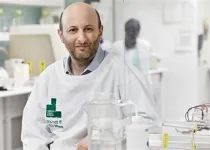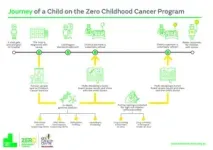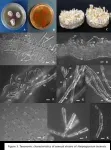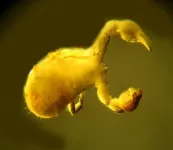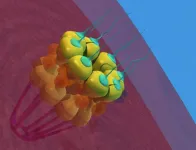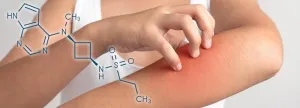(Press-News.org) WORLD-FIRST STUDY INTO PRECISION MEDICINE FOR HIGH-RISK CHILDHOOD CANCER YIELDS EXTRAORDINARY RESULTS
VIDEO - https://www.youtube.com/watch?v=bwyugwVwNzc
In a world-first, Australian researchers and clinicians have shown that precision medicine – where treatment is tailored to an individual child’s cancer – leads to significantly improved outcomes in children with high risk cancer.
In a study published this week in the leading international journal Nature Medicine, the researchers found that precision medicine (also called personalised medicine) was shown to be superior to standard or non-guided therapy, both in terms of clinical response and survival.
A staggering 55% of children who received their personalised treatment achieved complete or partial remission, or had their disease stabilised for at least 6 months. Given that that these children had highly aggressive cancers which, in many cases, had already failed to respond to standard therapy, these are remarkable results.
These children had been observed for an average of 3 years after receiving their personalised treatment. Treatment recommendations were given to their oncologists after detailed genetic analysis of the driver genes in the tumour. This strategy matched the drug better to each child’s cancer driver genes, often suggesting drugs that are not normally used to treat that cancer type. The results show, for the first time, that this had led to an improvement in progression-free survival.
“These are very exciting results which we believe have important implications for the treatment of children with cancer,” said Professor David Ziegler, Chair of Clinical Trials for the Zero Childhood Cancer Program and senior author on the paper. “We’ve already shown that precision medicine can help identify new treatment options for many high-risk patients. Now we’ve shown that it not only can shrink their tumours, but also lead to a significant improvement in long term survival for those patients.”
Over a minimum follow-up period of 18 months, the study included 384 children with high-risk cancers (with a very low chance of cure) enrolled on the Zero Childhood Cancer Program (ZERO), Australia’s national precision medicine program for children with cancer. ZERO is jointly led by Children’s Cancer Institute and Kids Cancer Centre at Sydney Children’s Hospital, Randwick and involves 9 child cancer treatment centres in the country. This study involved more than 100 scientists and clinicians working together across all these 9 child cancer centres.
To determine the impact on survival, the researchers measured ‘progression-free survival’, the length of time that a patient lives without their cancer getting any worse. The results showed that children who received a ZERO-recommended treatment did significantly better than those who did not. In fact, their 2-year progression-free survival was more than double that of children who received standard therapy (26% vs 12%), and five times higher than that of children who received an unguided treatment (a novel agent not chosen on the basis of molecular findings).
Importantly, the study found that children who received their recommended therapy early on in their treatment pathway did significantly better than those who received it after their disease had progressed, suggesting that the sooner a personalised treatment strategy can be implemented, the better the chance of preventing relapse and death.
Associate Professor Loretta Lau, a paediatric molecular oncologist at Kids Cancer Centre, researcher at Children’s Cancer Institute and first author on the paper, and Professor Glenn Marshall AM, Clinical Lead of ZERO and co-senior author on the paper, said the world-first study shows that precision medicine has the potential to change the model of care for children with cancer.
“Our study provides important new evidence that response to precision-guided therapy translates into improved survival,” said A/Prof Lau and Prof Marshall. “This work provides some hope to families where none previously existed in a new model of treatment for high-risk childhood cancer which is changing national and international clinical practice.”
Prof Ziegler, who is both a paediatric oncologist at the Kids Cancer Centre and a research leader at Children’s Cancer Institute, said, “We’ve shown that matching a therapy to a patient through molecular analysis of their cancer, and implementing that targeted therapy early on, are key to achieving the best possible results.”
Supported by the Australian Government and Minderoo Foundation and sponsored by the Australian and New Zealand Children’s Haematology and Oncology Group (ANZCHOG), ZERO’s first national precision medicine trial began in 2017, focusing on identifying new treatment options for children with high-risk cancers.
The success of this clinical trial led to joint funding of $67 million from the Australian Government ($55.8 million through the Department of Health’s Medical Research Future Fund) and Minderoo Foundation ($12.2 million) being awarded in 2020 to expand the program to be available to all 1200 Australians aged 0-18 years who are diagnosed with cancer—which was achieved in 2023. It is the first time that precision medicine has been made available to every child diagnosed with cancer, not just in Australia, but in any country in the world.
(Quote attributable to Federal Minister for Health Mark Butler)
Find out more about ZERO at https://www.zerochildhoodcancer.org.au
About ZERO Childhood Cancer
The Zero Childhood Cancer Program (ZERO) is a world-leading and Australian-first precision medicine program for children and young people with cancer. Led by Children’s Cancer Institute and the Kids Cancer Centre at Sydney Children’s Hospital, Randwick, it is a true multidisciplinary team effort of researchers and clinicians, and includes all nine of Australia’s children’s hospitals together with 22 national and international research partners.
Conducting in-depth genomic analysis for each child enrolled, ZERO aims to improve survival, reduce side effects, and advance science’s understanding of childhood cancer for the benefit of all. These advances are not only benefiting some children with cancer today, but are leading to a whole new understanding of childhood cancer that stands to revolutionise the model of care for all children with cancer in the future.
About Children’s Cancer Institute
Originally founded by two fathers of children with cancer in 1976, Children’s Cancer Institute is the only independent medical research institute in Australia wholly dedicated to research into the causes, prevention and cure of childhood cancer. More than 40 years on, our vision remains to save the lives of all children with cancer and improve their long-term health, through research. The Institute has grown to now employ over 350 researchers, operational staff and students, and has established a national and international reputation for scientific excellence. Our focus is on translational research, and we have an integrated team of laboratory researchers and clinician scientists who work together in partnership to discover new treatments which can be progressed from the lab bench to the beds of children on wards in hospitals as quickly as possible. By developing safer and more effective drugs and drug combinations, we aim to minimise side effects, giving children with cancer the best chance of cure with the highest possible quality of life. More at ccia.org.au
About Kids Cancer Centre
The Kids Cancer Centre (KCC) at Sydney Children’s Hospital, Randwick is part of Sydney Children’s Hospitals Network and has been treating children with cancer and blood diseases in NSW, Australia and the Asia-Pacific region for nearly 50 years. Almost two thirds of children treated for cancer or leukaemia at the Centre are enrolled on clinical trials, in a unique model where research and clinical care are one, ensuring the best possible care for children and their families. During that time the survival rates for children with cancer have gone from 10 per cent to nearly 80 per cent. Clinical and research staff from the Centre have made major international and national contributions to the expansion of knowledge in the area: from important discoveries around bone marrow transplantation, chemotherapy for relapsed solid tumours and leukaemia, to the invention of novel anti-cancer drug combinations and minimal residual disease testing in acute lymphoblastic leukaemia. Centre staff have been leaders in devising new methods of outreach and home nursing, and in developing modern approaches to the bereaved family. These achievements have been founded on academic excellence and clinical expertise. In the past five years alone, the Centre’s staff have published over 200 papers in peer reviewed medical and scientific journals and been awarded more than $60 million in competitive grant funding. The past 20 years has also seen a total of eight clinical staff receive the Order of Australia honours for their work. More at schn.health.nsw.gov.au
About Minderoo Foundation
Established by Andrew and Nicola Forrest in 2001, Minderoo Foundation is a modern philanthropic organisation seeking to break down barriers, innovate and drive positive, lasting change. Having invested more than $2.1 billion in the past two decades, Minderoo Foundation is proudly Australian, with key initiatives spanning from collaborating against cancer to ending plastic waste and modern slavery. More at minderoo.org.
About Medical Research Future Fund
The Medical Research Future Fund (MRFF) is an ongoing research fund set up by the Australian Government in 2015. It provides an ongoing funding stream for important health and medical research projects.
About ANZCHOG
ANZCHOG is a non-profit organisation committed to ensuring Australian and New Zealand children receive world-class cancer care. We are the peak professional body for paediatric oncologists and health professionals who care for children with cancer, spearheading national initiatives to enhance clinical care through communication, research, networking and education. We are also the national cooperative clinical trials group for childhood cancer, actively working with trial consortia around the globe to ensure Australian and New Zealand children have the opportunity to access the latest promising cancer treatments.
END
World-first study into precision medicine for high-risk childhood cancer yields extraordinary results
World first study shows precision medicine leads to significantly improved outcomes in children with high-risk cancer
2024-06-06
ELSE PRESS RELEASES FROM THIS DATE:
Better farming through nanotechnology
2024-06-06
Advanced technologies enable the controlled release of medicine to specific cells in the body. Scientists argue these same technologies must be applied to agriculture if growers are to meet increasing global food demands.
In a new Nature Nanotechnology journal review paper, scientists from UC Riverside and Carnegie Mellon University highlight some of the best-known strategies for improving agriculture with nanotechnology.
Nanotechnology is an umbrella term for the study and design of microscopically small things. How small? A nanometer is one billionth of a meter, or about 100,000 times smaller ...
First-of-its-kind test can predict dementia up to nine years before diagnosis
2024-06-06
Peer Reviewed | Observational study | People
Researchers at Queen Mary University of London have developed a new method for predicting dementia with over 80% accuracy and up to nine years before a diagnosis. The new method provides a more accurate way to predict dementia than memory tests or measurements of brain shrinkage, two commonly used methods for diagnosing dementia.
The team, led by Professor Charles Marshall, developed the predictive test by analysing functional MRI (fMRI) scans to detect changes in the brain’s ‘default mode network’ (DMN). The DMN connects regions of the brain ...
Popular chatbot is a politically left-leaning EU supporter
2024-06-06
With the European Parliament elections now underway, millions of EU citizens are finalizing their decisions about which political party best represents their views.
But anyone using LlamaChat, one of the major new AI chatbots, is very likely to be confronted with biased answers. It turns out that the large language model developed by Meta, upon which LlamaChat is based, has clear political leanings. This has been demonstrated in a new study from the University of Copenhagen in which Department of Computer Science researchers examined the language model's knowledge of political groups in the European Parliament. Moreover, they tested LlamaChat’s ...
Doctors advise caution as energy drinks may trigger life-threatening cardiac arrhythmias in patients with genetic heart diseases
2024-06-06
Philadelphia, June 6, 2024 – A new study in Heart Rhythm, the official journal of the Heart Rhythm Society, the Cardiac Electrophysiology Society, and the Pediatric & Congenital Electrophysiology Society, published by Elsevier, examined the potential dangers of consuming energy drinks for patients with genetic heart diseases. A cohort of 144 sudden cardiac arrest survivors was examined at Mayo Clinic, of which seven patients (5%) had consumed one or more energy drinks in close proximity to their cardiac ...
Only around half of individuals disclose or believe they should reveal having an STI prior to sexual intercourse, research to-date suggests
2024-06-06
A review of research to-date reveals the complex nature of revealing a diagnosis of a sexually transmitted infection (STI) to a partner ahead of engaging in sexual activity.
With individuals experiencing a variety of feelings and emotions related to the prospect of disclosure, the research shows that only around half or fewer individuals felt able to disclose their diagnosis to a partner before sexual engagement.
Peer-reviewed results, published today in The Journal of Sex Research, also show a similar number of people believed they should have to disclose having a STI to a partner prior to engaging in sexual intercourse.
In order ...
Climate crisis puts Australia’s ski industry on slippery slope, but not all hope is lost
2024-06-06
Australia’s ski industry is at risk of major disruptions and shorter seasons if the current level of climate pollution continues, according to new modelling from Protect Our Winters Australia (POW) and The Australian National University (ANU).
The report found the average ski season across all resorts in Australia will be 44 days shorter by 2050 under a mid-greenhouse gas emissions scenario and 55 days shorter under a high-emissions scenario.
It also shows that despite a dramatic decline in snowfall under mid- and high-emissions scenarios, the ...
Tiny roundworms carve out unique parasitic niche inside pseudoscorpion’s protective covering
2024-06-06
CORVALLIS, Ore. – The early worm gets the arachnid, fossil research by an Oregon State University scientist has shown.
In a parasitic first, a Baltic amber specimen has revealed that millions of years ago tiny worms known as nematodes were living inside of and feeding on the outer protective layer of pseudoscorpions.
“This is very strange,” said George Poinar Jr., who has a courtesy appointment in the OSU College of Science. “No other invertebrate-associated nematodes are known to have this detailed habit.”
Findings were published in Historical Biology.
Pseudoscorpions are a highly diverse lineage of arachnid, said Poinar, an international expert in ...
Research shows GLP-1 receptor agonist drugs are effective but come with complex concerns
2024-06-06
Drugs like Ozempic, Wegovy and Mounjaro have been around for years, but they’ve recently been making headlines due to a rise in popularity as weight loss agents. They all belong to a class of drugs known as glucagon-like peptide-1 receptor agonists (GLP-1RAs), which mimic a hormone (GLP-1) in the body that helps control insulin and blood glucose levels and promotes feelings of satiety.
These drugs are extremely effective for blood glucose control and weight management, which, combined with their relatively limited side effect profile, makes them ...
How a protein component of nuclear pore complexes regulates development of blood cells and may contribute to myeloid disorders
2024-06-06
Nuclear pore complexes (NPCs) are channels composed of multiple proteins that ferry molecules in and out of the nucleus, regulating many critical cellular functions, such as gene expression, chromatin organization and RNA processes that influence cell survival, proliferation, and differentiation.
In recent years, new studies, including work by Maximiliano D’Angelo, Ph.D., associate professor in the Cancer Metabolism and Microenvironment Program at Sanford Burnham Prebys, have noted that NPCs in cancer cells are different, but how ...
Drug used to treat eczema may provide relief for patients with intensely itchy skin diseases
2024-06-06
A drug approved to treat eczema provided significant improvement in the symptoms of patients with severe itching diseases that currently have no targeted treatments, according to a new study published in JAMA Dermatology. The drug, abrocitinib, was found to cause minimal side effects during a small 12-week study led by University of Maryland School of Medicine (UMSOM) researchers. It was beneficial for those with an itching disease called prurigo nodularis as well as for those with chronic pruritus of unknown origin, a condition that causes chronic unexplainable itching symptoms.
“Very ...
LAST 30 PRESS RELEASES:
Exercise and nutritional drinks can reduce the need for care in dementia
Michelson Medical Research Foundation awards $750,000 to rising immunology leaders
SfN announces Early Career Policy Ambassadors Class of 2026
Spiritual practices strongly associated with reduced risk for hazardous alcohol and drug use
Novel vaccine protects against C. diff disease and recurrence
An “electrical” circadian clock balances growth between shoots and roots
Largest study of rare skin cancer in Mexican patients shows its more complex than previously thought
Colonists dredged away Sydney’s natural oyster reefs. Now science knows how best to restore them.
Joint and independent associations of gestational diabetes and depression with childhood obesity
Spirituality and harmful or hazardous alcohol and other drug use
New plastic material could solve energy storage challenge, researchers report
Mapping protein production in brain cells yields new insights for brain disease
Exposing a hidden anchor for HIV replication
Can Europe be climate-neutral by 2050? New monitor tracks the pace of the energy transition
Major heart attack study reveals ‘survival paradox’: Frail men at higher risk of death than women despite better treatment
Medicare patients get different stroke care depending on plan, analysis reveals
Polyploidy-induced senescence may drive aging, tissue repair, and cancer risk
Study shows that treating patients with lifestyle medicine may help reduce clinician burnout
Experimental and numerical framework for acoustic streaming prediction in mid-air phased arrays
Ancestral motif enables broad DNA binding by NIN, a master regulator of rhizobial symbiosis
Macrophage immune cells need constant reminders to retain memories of prior infections
Ultra-endurance running may accelerate aging and breakdown of red blood cells
Ancient mind-body practice proven to lower blood pressure in clinical trial
SwRI to create advanced Product Lifecycle Management system for the Air Force
Natural selection operates on multiple levels, comprehensive review of scientific studies shows
Developing a national research program on liquid metals for fusion
AI-powered ECG could help guide lifelong heart monitoring for patients with repaired tetralogy of fallot
Global shark bites return to average in 2025, with a smaller proportion in the United States
Millions are unaware of heart risks that don’t start in the heart
What freezing plants in blocks of ice can tell us about the future of Svalbard’s plant communities
[Press-News.org] World-first study into precision medicine for high-risk childhood cancer yields extraordinary resultsWorld first study shows precision medicine leads to significantly improved outcomes in children with high-risk cancer
